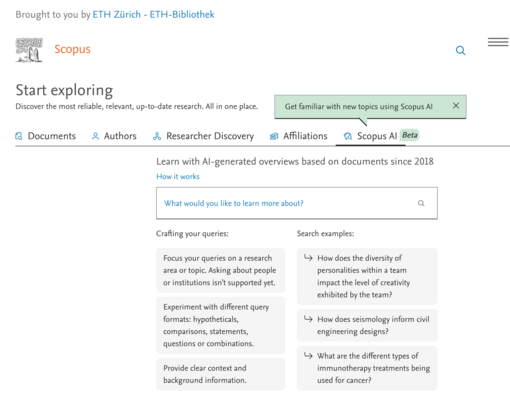ETH Zurich gets early access to Scopus AI
News
Scopus AI is a generative AI-enhanced research tool integrated into the Scopus to help navigate and understand academic content. ETH Zurich is one of four European institutions to receive early access.
Researchers, especially those early in their careers or working across disciplines, need to quickly understand and explore a particular topic, see connections across disciplines, and collaborate with. During the last months, Large Language Models (LLMs) have captured the world’s imagination with their ability to generate content, but they also have shortcomings such as a lack of transparency. Elsevier has now added these capabilities into its Abstracting & Indexing Database, Scopus (www.scopus.com) allowing researchers to benefit from these AI technologies when researching scientific literature.
Scopus AI, meanwhile in beta, is a new tab that appears on the Scopus search page.
Scopus AI generates easy-to-read topic summaries based on trusted content from more than 27,000 academic journals, from more than 7,000 publishers worldwide, more than 1.8 billion citations, and more than 17 million author profiles. Researchers can quickly drill down and explore these topics in a variety of ways, including suggested follow-up questions and links to the original research, powered by generative AI and LLM technology combined with Scopus' existing powerful search capabilities.
How Scopus AI works
- Enter your natural-language query to begin
- Review your generated summary of the results. The summary has Scopus references, so you know where the content is coming from
- Go deeper using Related Queries to discover new perspectives and to better understand a research topic better and better
- View the graphical representation to see connections between keywords
For this pilot, Scopus AI is currently testing the latest Large Language Models (LLMs) and other technologies in combination with Elsevier’s own technology and all Scopus content types (metadata and abstracts; but not full-text articles) from 2018 to present. The usage is private, meaning there is no data exchange or use of your data to train the public model.
For the time being, access is limited to November 6, 2023. Please use this opportunity to explore Scopus AI and to influence the further development. Please direct feedback to Dr. Oliver Renn.
More Information
Website Elsevier Scopus AI und with link to videos
Original Press Release
| Published: |
|---|
